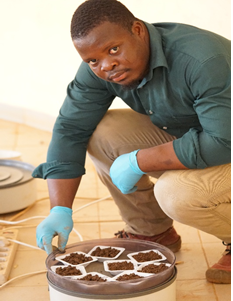
Kassim TCHAN I
The development of new cultural practices (intensive agriculture) in recent decades has contributed to the pollution of agricultural and forest followed by great disturbance within the micro-biomes community (bacteria and fungi). Soil microbiomes constitute an important part of the soil biomass, which places them among the essential actors that contribute to the functioning and balance of ecosystems. Their complex activities and interactions in the soil play a crucial role in the recycling of Carbon (C) and Nitrogen (N), thus defining the physical and chemical structure of the soil, as well as in the availability of nutrients essential for the growth of cultivated plants. Despite this key role, our knowledge of the diversity and composition of communities in these micro-biomes and the impact of land use patterns on these communities is still very incomplete. One approach to overcome this lack of knowledge is to study the phylogenetic diversity of microbiomes on a large number of agricultural soils according to climatic zones and indigenous/exotic soil management techniques. Thanks to recent developments in molecular tools, we will link indigenous know-how of soil fertility management with belowground microbiomes by mean of most modern molecular techniques/methods. We are attempting to promoting agro-ecological practices by identifying the local soil fertility management techniques that reconciles higher crops yields, mitigates the Green House Gases emission whilst preserving the integrity of soil microbiome.

Processing of forest soil samples from West Africa, Sikasso, Mali (Tchan I. Kassim, 2018)
Traitement des échantillons des sols forestiers de l’Afrique de l’Ouest, Sikasso, Mali (Tchan I. Kassim, 2018)
